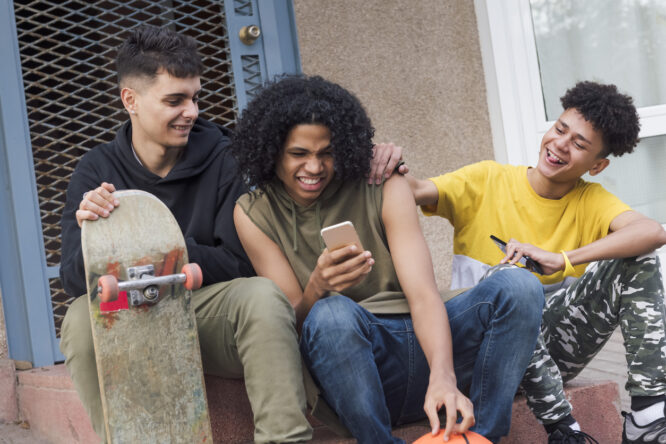Friendships are often the relationships that carry us through thick and thin in life, but they can sometimes fall to the bottom of the priority list.

That being said, you don’t need a dramatic heart-to-heart or an extravagant gesture to keep them alive. It’s the simple, genuine things that keep friendships grounded and growing—things anyone can do, no matter how busy life gets.
Whether you’ve been friends since school or recently clicked with someone new, every strong friendship needs regular attention and small acts of care. Here are a few easy things that can help you hold on to the people who matter most, and make your friendships last long after the texts slow down or the meet-ups become less frequent.
1. Send a message just because.

You don’t need a reason to reach out. A quick “Hey, just thinking about you—how’s life?” or even a funny meme that reminds you of them can keep the connection warm. We often assume that if someone really matters, we’ll naturally stay in touch, but life has a way of getting in the way of those good intentions.
Being the person who sends that first message without waiting for a special occasion shows effort and care. It’s a simple act that reminds your friend they’re on your mind, even when nothing big is happening. Often, those out-of-the-blue check-ins become the very moments that keep a friendship alive during quieter seasons.
2. Make actual plans, and stick to them.

It’s easy to say “Let’s catch up soon,” and never follow through. Turning vague talk into something concrete—whether it’s coffee next week or a phone call on Sunday—makes all the difference. It shows your friend that spending time with them isn’t just a nice idea, but a real priority.
Following through builds trust in small ways. You’re showing that your word means something, and that your time together matters. Life gets busy, but consistent effort, even if it’s every few months, makes a friendship feel stable rather than seasonal.
3. Celebrate the good things that happen to and for them, no matter how small.

Whether they landed a new job, ran a 5K, or finally got around to painting their living room, let your friend know you see them. Celebrating doesn’t have to mean balloons and confetti; it can be as simple as a “You smashed it!” text or raising a glass when you’re together.
Taking joy in their wins without comparison or half-hearted praise helps friendships grow. When people feel genuinely supported and encouraged by you, they’ll keep letting you into their world. That kind of encouragement creates emotional safety that lasts well beyond the moment itself.
4. Be honest when something feels off.

It’s normal for little misunderstandings or weird moments to come up in any friendship, but instead of letting them fester, a gentle check-in can go a long way. Saying something like “Hey, I felt a bit off after that convo—can we talk?” opens the door to clarity, not fighting.
Honesty deepens connection. You don’t have to accuse or be dramatic—just be real. When both people feel comfortable sharing their feelings without fear of drama, the friendship becomes stronger, not more fragile.
5. Remember the little things because they often matter most.

If your friend has a big presentation coming up, or they mentioned their cat wasn’t well, remembering to ask about it shows you actually listen. These small follow-ups say more than grand gestures because they reflect thoughtfulness, not just politeness.
Friendship isn’t built in big declarations; it’s built in those moments where someone realises, “Wow, they remembered.” Whether it’s a birthday, a stressful week, or even their go-to coffee order, showing that you’re paying attention builds trust in a quiet but important way.
6. Show up during the hard stuff.

Anyone can be there when life is good, but the friends who check in during breakups, burnout, grief, or even just a bad Tuesday—those are the ones who last. You don’t need perfect words or a magical solution. Sometimes just saying “I’ve got you” is enough.
It’s during the heavy moments that people really notice who’s around. A thoughtful message, a doorstep coffee, or just sitting with them in silence can mean more than you think. It’s not about fixing—it’s about not letting them go through it alone.
7. Ask how they really are.

We’re all guilty of throwing out a quick “How are you?” and expecting a one-word answer. However, stopping, listening properly, and asking again if they hesitate can open up space for real conversation. Sometimes, your friend needs permission to go deeper.
Creating space for honesty without rushing to respond or fix makes someone feel emotionally safe around you. When people feel like they can be fully seen—messy, confused, or struggling—it’s a sign of a strong and lasting bond.
8. Don’t keep score.

Friendship isn’t a transaction. There will be times when one person is more available, more present, or more giving, and that’s okay. The balance doesn’t need to be perfect every time, as long as there’s effort from both sides in the long run.
Keeping tabs on who called who last or who always plans the hangouts builds silent resentment. Trust grows when both people feel safe enough to ebb and flow without fear of being “too much” or “not enough.” Let it breathe without tallying up every interaction.
9. Respect their boundaries.

Even the closest friends need space. Maybe they’re not in the mood to talk, or they need time to themselves. Whatever it is, let them have it without guilt-tripping or taking it personally. Giving your friend breathing room shows maturity and emotional respect.
Boundaries aren’t about distance; they’re about sustainability. Respecting what someone needs, even when you don’t fully understand it, builds trust. When a friendship makes room for autonomy, it actually grows stronger, not weaker.
10. Let them see the unfiltered version of you.

It’s easy to present a polished version of ourselves, but real friendships grow through vulnerability. Letting your friend see the not-so-perfect sides—your doubts, awkward moments, or emotional lows—helps them feel safe to do the same.
You don’t have to overshare, but being real invites closeness. When you stop performing and start being yourself, the friendship shifts from casual to meaningful. It stops being about appearances and starts being about actual connection.
11. Keep the humour alive.

Don’t underestimate how far a shared laugh can go. Whether it’s a dumb meme, an inside joke, or a voice note mid-rant, humour keeps friendships fun and easygoing. It’s what breaks the tension and reminds you why you enjoy each other’s company in the first place.
Laughter doesn’t just lighten the mood, it bonds people. The friends who laugh together through life’s weirdness and mess tend to stick around because joy becomes part of the foundation, not just a bonus.
12. Own your mistakes and say sorry.

No one’s perfect, and we all mess up sometimes. If you hurt your friend, intentionally or not, just own it. A sincere apology doesn’t make you weak. It makes you trustworthy and emotionally mature.
You don’t need to make a big deal out of it. Just saying “I got that wrong, and I’m sorry” keeps small issues from growing into big ones. Accountability keeps relationships healthy because it proves you care about how your actions affect the other person.
13. Keep checking in even when life gets hectic.

Schedules fill up, responsibilities grow, and it’s easy to lose touch without meaning to. However, sending a quick “How’s your week going?” or sharing a random update is enough to keep the thread intact when you can’t hang out regularly.
You don’t have to be in constant contact. Just keep showing up in small ways that say, “I haven’t forgotten about you.” Consistency, no matter how low-key, is often the glue that holds friendships together long-term.
14. Say the appreciation out loud.

We assume our friends know we love and value them, but it’s always worth saying. A message like “You’ve been such a solid friend to me lately” or “I’m really grateful for you” can mean more than you think, especially if they’ve had a rough week.
It doesn’t have to be a grand speech—just honest words that remind them they matter. Verbal appreciation keeps friendships warm and alive, even during quiet phases. A little “thank you for being you” goes a long way.




